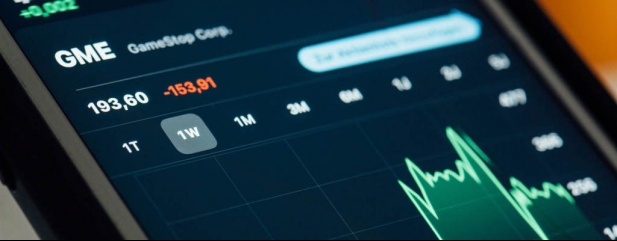Archived article
Please note that tax, investment, pension and ISA rules can change and the information and any views contained in this article may now be inaccurate.
What the GameStop games really mean

One of the most intriguing things about the surge in shares in loss-making American video games and consoles retailer GameStop is how they gained so much in a week when the broader US indices had their worst five-day spell since October. Such gyrations do not normally breed confidence.
The spike in the VIX fear index that accompanied the stampede into GameStop and tramping of hedge funds’ positions by retail investors (at least to some degree) is therefore equally eye-catching, especially in the context of overall US equity market valuations, which on some metrics look very lofty by historic standards, as discussed by this column last week.
The VIX is a measure of expected volatility so someone, somewhere is buckling up in preparation for choppier times ahead (although extreme readings are often useful contrarian indicators). Add in three other ‘softer’ gauges of sentiment toward US equities and you can perhaps understand why, although there are enough variables at play to give support to the bullish view that the Dow Jones, S&P 500 and NASDAQ Composite benchmarks could yet confound the doubters.
SHORT SQUEEZE
The first indicator relates to GameStop and the epic ‘short squeeze’ which has inflicted pain on hedge funds who were betting on a drop in the share price and instead were confronted by stunning gains.
Those hedge funds have mismanaged their risks and paid the penalty. To be caught shorting stocks where total short positions exceeded the total free float of the target company left them exposed to a squeeze if the fortunes of that firm turned around unexpectedly or what remain bouncy markets started to lift all boats on the tidal wave of liquidity provided for markets by central banks’ ultra-loose monetary policy.
Credit where credit is due to the retail investors who spotted this and profited from it.
But the most shorted stocks in America have been massively outperforming the wider benchmarks since last November.
This suggests that GameStop was a professional hit first – hedge funds forcing other hedge funds out of their positions by squeezing share prices higher – with retail investors cottoning on (or even being encouraged to follow a trail of breadcrumbs?) and piling in second.
The share gains may have little or nothing to do with the company’s fundamentals and everything to do with market technicals and unalloyed financial speculation – something that tends to develop a lot closer to stock market tops than it does stock market bottoms.
FLOATING HIGHER
But it is not just old, previously downtrodden stocks that are feeling the love. Market newcomers are receiving plenty of adulation, too. This can be seen in US-traded Renaissance IPO exchange-traded fund, which is designed to mirror the returns from 80% of the market capitalisation of the universe of companies that have gone public in America within the last two years, minus its running costs.
Airbnb and DoorDash were both added at the last quarterly review in December. The ETF currently tracks 49 stocks and it is up by a third since November, helped by strong early gains in those two recent market entrants. Investors snapping up IPOs for the early share price ‘pop’ and to snag a quick gain can also sometimes be a sign of a frothy market.
One other trend that can be a sign of animal spirits and that as a result investors and traders are perhaps taking on more risk than they would normally is margin debt. This is the amount of money an investor can borrow from their broker via a margin account to buy shares (or even short sell them).
Regulations cap the amount that can be borrowed at 50% of the account balance but even so, margin debt is at record highs. This gears returns when markets are rising (as the investor or trader can get more exposure) but looks less clever when markets are falling. Indeed, falling asset prices can force so-called margin calls where the investor or trader must start repaying the loan – and sometimes they must sell other positions to fund that repayment, creating a negative feedback loop in markets.
CONCLUSION
There is no sign of such forced selling yet, although it will be worth watching for it should GameStop’s shares start to sag and there is no guarantees that history will repeat itself and see these trends act as an early warning sign of a market top.
After all central banks keep on pumping out liquidity and emboldened investors and traders, accustomed to their support, may simply demand more if there is a market dislocation, although whether this is a trend to be encouraged over the long run is questionable. As British economist (and shrewd stock market participant) John Maynard Keynes once noted, ‘When the capital formation of a country becomes the by-product of a casino, the job is likely to be ill-done.’
Important information:
These articles are provided by Shares magazine which is published by AJ Bell Media, a part of AJ Bell. Shares is not written by AJ Bell.
Shares is provided for your general information and use and is not a personal recommendation to invest. It is not intended to be relied upon by you in making or not making any investment decisions. The investments referred to in these articles will not be suitable for all investors. If in doubt please seek appropriate independent financial advice.
Investors acting on the information in these articles do so at their own risk and AJ Bell Media and its staff do not accept liability for losses suffered by investors as a result of their investment decisions.
Issue contents
Feature
First-time Investor
Great Ideas
Money Matters
News
- Amazon drops a bombshell during bumper US earnings season
- Pfizer sales boost puts vaccine economics under the spotlight
- Dr. Martens and Moonpig ‘pop’ on market debuts
- BP’s big challenge in funding its transition to renewable energy
- GameStop loses momentum but is the Reddit movement here to stay?
- What you need to know about changes to Bankers and Baillie Gifford European shares
- Marston’s fights takeover interest from US private equity firm

 magazine
magazine











